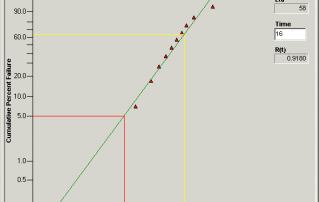Weibull Analysis is a methodology for determining reliability characteristics and trends from field and/or test data. It allows decisions to be made based on a limited amount data. A special case with very few data points is WeiBayes Analysis. Results for a two-parameter Weibull Analysis provide estimates of an improving/degrading reliability trend (value of β) and the characteristic life (value of η, the estimated time at which 63.2% of a population will have failed due to a specific failure mode).
Weibull Analysis
Data & Tools
Publications
Training
What is it?
Weibull Analysis is a methodology for determining reliability characteristics and trends from field and/or test data. It allows decisions to be made based on a limited amount data. A special case with very few data points is WeiBayes Analysis. Results for a two-parameter Weibull Analysis provide estimates of an improving/degrading reliability trend… Read More
Lunchtime Learning Series
Which Design is More Reliable? Weibull Provides Answers!
Weibull Analysis is often used to analyze field or test failure data to understand how items are failing and what specific underlying failure distribution is being followed by failures that occur. One of our staff engineers was recently responsible for making a vendor recommendation for a limited life item that had a specified 5% minimum… Read More



